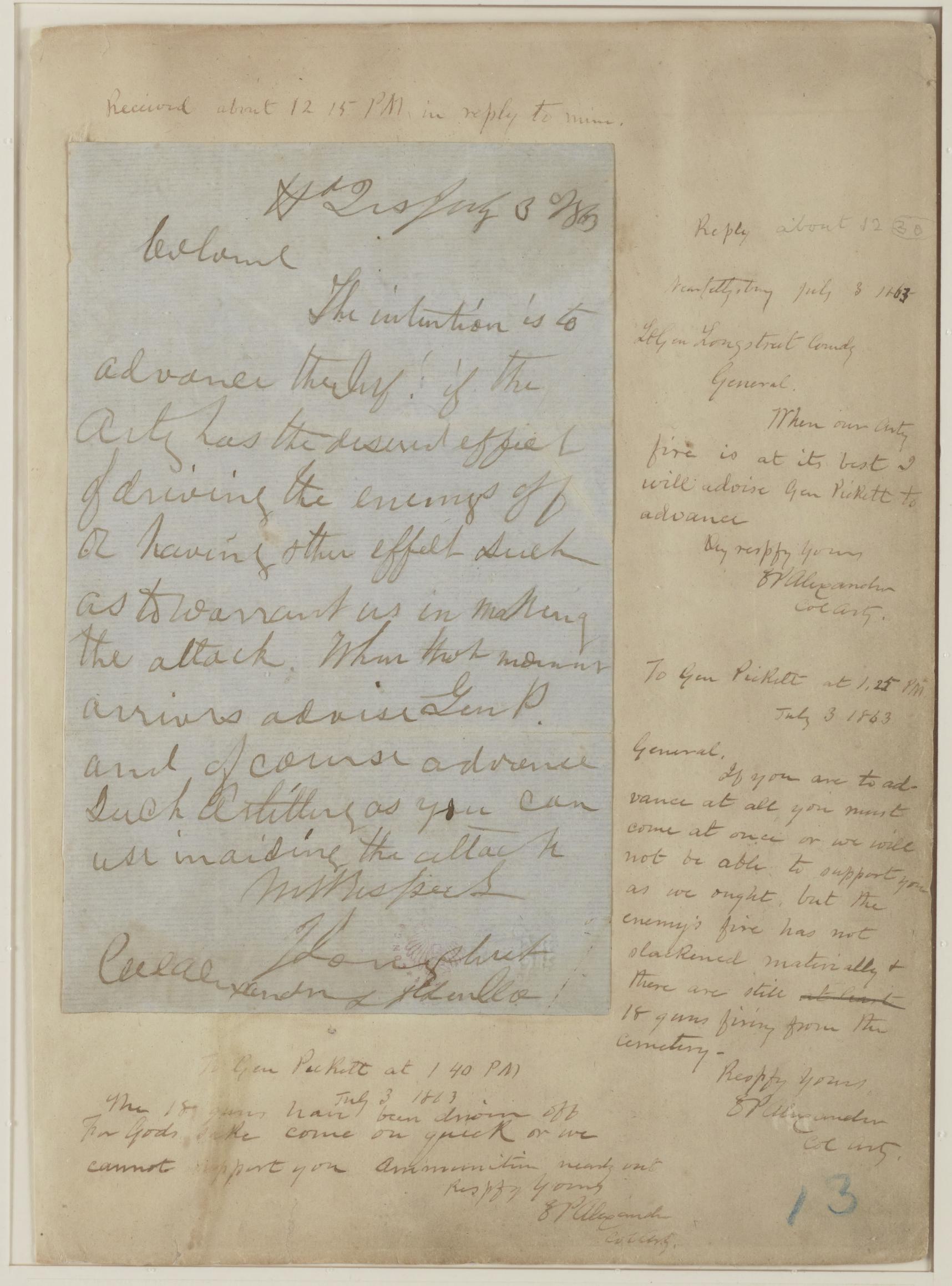
Letter, Gen. James Longstreet to Col. Edward P. Alexander; and copies of Alexander's battlefield dispatches to Longstreet and Gen. George E. Pickett during the battle of Gettysburg, 3 July 1863.
Date Created:
Place Created: Gettysburg, PA
Year Created: 1863
Historical Theme:
Collection this Document is Affiliated with:
Description:
During the first three days of July 1863, Union and Confederate forces met in battle at Gettysburg, Pennsylvania, an encounter that many historians consider the turning point in the Civil War. The culminating event of the battle was Pickett's Charge, the unsuccessful assault on the Union center ordered by Gen. Robert E. Lee (1807-1870) and executed by numerous troops, including an infantry division under the command of Gen. George E. Pickett (1825-1875). Preparations for the famous charge, which occurred on the battle's third day, included the traditional artillery barrage described in these documents. In a letter written on the field of battle, Gen. James Longstreet (1821-1904) informed Col. Edward P. Alexander (1835-1910), reserve artillery commander, of the intended Confederate advance, which he said would be dependent on Alexander's battery providing the necessary artillery support. Longstreet also ordered Alexander to advise General Pickett when to initiate the charge.
Having retained Longstreet's order, Alexander later mounted the item on a larger backing sheet and added to it copies of his battlefield dispatches to both Longstreet and Pickett, which depict the increasing urgency of the Confederate position. At 1:25 p.m., Alexander wrote to Pickett, "If you are to advance at all, you must come at once or we will not be able to support you as we ought . . . " Fifteen minutes later, the artillery commander wrote again to Pickett, "For God's sake come on quick or we cannot support you. Ammunition nearly out."
Although Pickett's name is associated with the failed charge, he did not command the attack, and his troops comprised only a portion of the advancing columns. He was responsible for forming the brigades involved in the charge and conducted himself honorably throughout the engagement. Still, history has treated him unfairly, and he will forever bear the onus of defeat.
Categories of Documents:
Received about 12:15 PM in reply to mine 12 hrs July 3, 1863
Colonel
The intention is to advance today: if the Arty has the desired effect of driving the enemy off or having the other effect such as to warrant us in making the attack. When the morning arrives advise Gen P. [General Pickett] and of course advance such artillery as you can use in aiding the attack.
With Respect
J Longstreet
Col. Alexander
To Gen Picket at 1:40 PM
July 3 1863
The 18 guns have been ???? off For gods sake come on quick or we cannot support you Ammunition nearly out
Respectfully Yours
EP Alexander
Col Arty.
Reply at about 12:30
Near Gettysburg July 3 1863
Gen Longstreet Comd.
General, When our arty fire is at its best I will advise Gen Pickett to advance
Respectfully Yours,
E P Alexander
Col Arty.
To Gen Pickett at 1:25 PM
July 3 1863
General, If you are to ad-vance at all you must come at once or we will Not be able to support you as we ought, but the enemy’s fire has not Slackened materially + there are still at least 18 guns firing from the cemetery
Respectfully Yours,
E P Alexander
Col Arty.
Citation:
Letter, Gen. James Longstreet to Col. Edward P. Alexander; and copies of Alexander's battlefield dispatches to Longstreet and Gen. George E. Pickett during the battle of Gettysburg, 3 July. 3 July, 1863. Manuscript/Mixed Material. Retrieved from the Library of Congress, <www.loc.gov/item/mcc.001/>.
Web Address:

